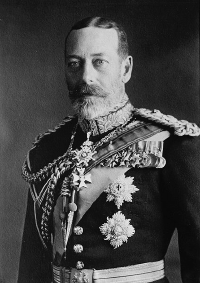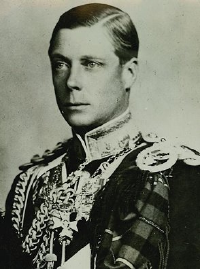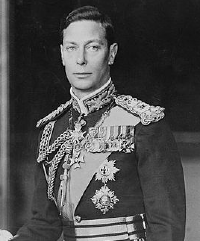



Broadcasts by the King were
an important part of the BBC's history. Before radio,
the monarch was a distant and unfamiliar person - most
people might have seen him from a distance once or
twice in their lifetimes, and heard him only in a
public speech. There was a considerable feeling of
loyalty to the King right through and beyond the
Second World War, and the royal broadcasts were
important occasions to many listeners.
Radio provided the regular
Christmas broadcasts by the King from 1932 onwards, as
well as the drama of the broadcast abdication speech
of Edward VIII. The 1937 Coronation was a landmark
broadcast and a considerable technical achievement,
including a full relay of the service; the procession
was also broadcast by the new and still experimental
television service.
OPENING OF THE BRITISH EMPIRE
EXHIBITION, WEMBLEY, 23 April 1924.
The live broadcast of the King's speech (click here for
picture) was an important moment
in radio; the first broadcast by a British Monarch,
and the first time many people were really aware of
radio's existence as anything other than a toy. The
BBC had no recording facilities at the time, but the
broadcast was recorded by an amateur on a home-made
acoustic recorder. Obviously I don't have the
originals: this is from a dubbing I obtained. As the
quality is poor I have included only the first side
here.
MESSAGE TO THE EMPIRE, CHRISTMAS
DAY 1932
This was the first royal Christmas message, and its personal touch was much appreciated by the wide audience - not only in Britain, but relayed over the world. It began a tradition which, with only a couple of interruptions, continues to the present day (though the modern television messages are much less formal). The speech was issued by HMV on RBS4359, as were many of the subsequent Christmas messages: shorter than the later ones, it runs 3'09".
This was the first royal Christmas message, and its personal touch was much appreciated by the wide audience - not only in Britain, but relayed over the world. It began a tradition which, with only a couple of interruptions, continues to the present day (though the modern television messages are much less formal). The speech was issued by HMV on RBS4359, as were many of the subsequent Christmas messages: shorter than the later ones, it runs 3'09".
'WELCOME TO THEIR MAJESTIES':
The King's Silver Jubilee was celebrated on 6 May
1935: the BBC broadcast a commentary on the
procession, and excerpts from this were copy-edited
together and issued by HMV on RC2747. Though Outside
Broadcasts were by now a well-established part of the
BBC's output, and had reached a considerable level of
technical sophistication, there was still something of
a feeling of magic of ordinary listeners being able
able to experience something of the event. The record
runs 6'03".
SILVER JUBILEE MESSAGE TO THE
EMPIRE, 6 May 1935
The King's broadcast message was relayed on short-wave to many parts of the widespread British Empire by the BBC's Empire Service, which had begun in 1932 and developed to become the BBC World Service of today. In his speech the King recognized the difficulties experienced by many of his peoples, as Britain was still in the grip of the great Depression. The speech was issued on HMV RC2747 and runs 6'26"
The King's broadcast message was relayed on short-wave to many parts of the widespread British Empire by the BBC's Empire Service, which had begun in 1932 and developed to become the BBC World Service of today. In his speech the King recognized the difficulties experienced by many of his peoples, as Britain was still in the grip of the great Depression. The speech was issued on HMV RC2747 and runs 6'26"
MESSAGE TO THE EMPIRE, 1 March
1936
With the death of King George V on 20 January 1936 his son, the then Prince of Wales, became King. He broadcast this accession speech, which was issued by HMV on RB8417 - and presumably withdrawn in a hurry when he abdicated on 11 December 1936, so it's quite rare (click ‘play’ to see the label). The events behind the abdication had been hidden from the British public, so it was not until it happened that most people knew that his wish to marry Mrs. Wallis Simpson, a divorcée (which he would not have been allowed to do as King) had led to his abdication. This accession speech runs 7'12".
With the death of King George V on 20 January 1936 his son, the then Prince of Wales, became King. He broadcast this accession speech, which was issued by HMV on RB8417 - and presumably withdrawn in a hurry when he abdicated on 11 December 1936, so it's quite rare (click ‘play’ to see the label). The events behind the abdication had been hidden from the British public, so it was not until it happened that most people knew that his wish to marry Mrs. Wallis Simpson, a divorcée (which he would not have been allowed to do as King) had led to his abdication. This accession speech runs 7'12".
CORONATION SERVICE, WESTMINSTER
ABBEY, 12 May 1937 (excerpts)
The Coronation was a major outside broadcast event for the BBC; the entire service was broadcast (click here for a picture of the mixing equipment). It was also recorded by HMV, copy-edited to remove the inevitable pauses, and issued as an album on RG1-15. I've chosen three excerpts: the Recognition; the Oath and Declaration; and the Putting On Of The Crown. The commentary is by the Rev. F.A.Iremonger (the King's Chaplain) and the recording runs 7'58".
The Coronation was a major outside broadcast event for the BBC; the entire service was broadcast (click here for a picture of the mixing equipment). It was also recorded by HMV, copy-edited to remove the inevitable pauses, and issued as an album on RG1-15. I've chosen three excerpts: the Recognition; the Oath and Declaration; and the Putting On Of The Crown. The commentary is by the Rev. F.A.Iremonger (the King's Chaplain) and the recording runs 7'58".
MESSAGE TO THE EMPIRE, 12 May 1937
With the abdication of Edward VIII, his younger brother, the Duke of York, became King George VI. He had never been prepared for this role; but despite a hesitant manner caused by a speech impediment he gained the affection of the people, particularly during the Second World War. He died in 1952 and was succeeded by Elizabeth, his daughter.
This speech was broadcast on the evening of Coronation day, and issued by HMV on RG15 as part of the Coronation album. It runs 7'52".
With the abdication of Edward VIII, his younger brother, the Duke of York, became King George VI. He had never been prepared for this role; but despite a hesitant manner caused by a speech impediment he gained the affection of the people, particularly during the Second World War. He died in 1952 and was succeeded by Elizabeth, his daughter.
This speech was broadcast on the evening of Coronation day, and issued by HMV on RG15 as part of the Coronation album. It runs 7'52".
